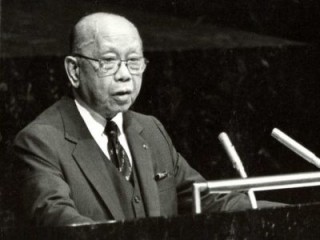
Carlos P. Romulo biography
Date of birth : 1899-01-14
Date of death : 1985-12-15
Birthplace : Manila, Republic of the Phillipines
Nationality : Filipino
Category : Famous Figures
Last modified : 2011-02-01
Credited as : Author, diplomat of Philippines,
Carlos P. Rómulo was an author and the foremost diplomat of the Philippines. He was the only Filipino journalist to win the Pulitzer Prize and the first Asian to serve as president of the UN General Assembly (1949). He also gained prominence as America's most trusted Asian spokesman.
Carlos Romulo was born on Jan. 14, 1899, in Manila; but his well-to-do parents lived in Camiling, Tarlac. His father, Gregorio, was a Filipino guerrilla fighter with the Philippine revolutionary government of Emilio Aguinaldo during the Filipino-American War. Rómulo claimed to have witnessed his grandfather tortured by the water cure administered by American soldiers. After early schooling in Tarlac, Rómulo entered the University of the Philippines, where he received a bachelor's degree in 1918. After getting a master of arts from Columbia University in 1921, he returned to work as professor of English and chairman of the English department of the University of the Philippines (1923-1928).
Rómulo became editor in chief of TVT Publications in 1931 and publisher and editor of the Philippines Herald (1933-1941). In 1929 he was appointed regent of the University of the Philippines. Previously he had served as secretary to Senate president Manuel Quezon (1922-1925) and as member of the Philippine Independence Mission, headed by Quezon. Rómulo belonged to the elite, the oligarchic stratum of the Filipino ruling class, by virtue of his role as defender of the interests of the propertied minority.
In 1941 Rómulo received the coveted Pulitzer Prize for a series of pioneering articles on the Southeast Asian political situation in which he recorded his extensive travels in China, Burma, Thailand, Indochina, Indonesia, and elsewhere. Nonetheless, in spite of his candid reporting, he confessed in an interview, "I held back a lot because as a writer I knew hatred is created by incidents." This revealed Rómulo's gift for shrewd diplomacy and somewhat "opportunistic" manner of dealing with people and events.
With the outbreak of World War II in 1941, Rómulo joined the staff of General Douglas MacArthur as press relations officer. He also served as secretary of information and public relations in Quezon's wartime Cabinet (1943-1944). He retreated with MacArthur from Bataan to Corregidor and then to Australia (1941-1942). While in Corregidor he broadcast for the Voice of Freedom. He served as aide-de-camp to MacArthur and rose from the rank of colonel (1942) to brigadier general (1944).
In 1945 Rómulo acted as Philippine delegate to the United Nations Organization Conference in San Francisco. He was Philippine ambassador to the United Nations from 1946 to 1954. He distinguished himself as the first Asian to become president of the UN General Assembly (Fourth Session, Sept. 20, 1949). In 1950-1951 Rómulo acted as secretary of foreign affairs of the Philippine Republic and, from 1952 on (with some interruptions), as Philippine ambassador to the United States.
After serving as president of the University of the Philippines and secretary of education (1963-1968), Rómulo was appointed by President Marcos to the post of secretary of foreign affairs. Rómulo was the recipient of more than a hundred honorary doctorates, awards, and medals, given by American and Asian universities, organizations, and foreign governments.
Rómulo's prolific pen is attested to by his books, such as I Saw the Fall of the Philippines (1942), Mother America (1943), My Brother Americans (1945), I See the Philippines Rise (1946), Crusade in Asia (1955), The Magsaysay Story (1956), I Walk with Heroes (1961), and Identity and Change (1965).
















